- Clone
- ML5 (See other available formats)
- Regulatory Status
- RUO
- Workshop
- V CD24.5
- Other Names
- Ly-52, Heat Stable Antigen (HSA), Nectadrin, BA-1
- Isotype
- Mouse IgG2a, κ
- Ave. Rating
- Submit a Review
- Product Citations
- publications
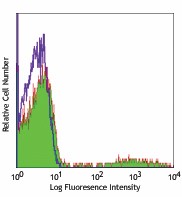
-

Human peripheral blood lymphocytes stained ML5 PE
| Cat # | Size | Price | Quantity Check Availability | Save | ||
|---|---|---|---|---|---|---|
| 311105 | 25 tests | 119 CHF | ||||
| 311106 | 100 tests | 262 CHF | ||||
CD24 is a 35-45 kD glycosylphosphatidylinositol (GPI)-linked protein also known as heat stable antigen (HSA), BA-1, Ly-52, and nectadrin. It is expressed on the surface of B cells (but not plasma cells), granulocytes, follicular dendritic cells, and epithelial cells. CD24 may play a role in the regulation of B-cell proliferation and maturation. CD24 crosslinking induces a Ca2+ flux in mature B cells. CD24 has been shown to interact with CD62P (P-selectin).
Product DetailsProduct Details
- Verified Reactivity
- Human
- Reported Reactivity
- Chimpanzee
- Antibody Type
- Monoclonal
- Host Species
- Mouse
- Formulation
- Phosphate-buffered solution, pH 7.2, containing 0.09% sodium azide and BSA (origin USA)
- Preparation
- The antibody was purified by affinity chromatography, and conjugated with PE under optimal conditions.
- Concentration
- Lot-specific (to obtain lot-specific concentration and expiration, please enter the lot number in our Certificate of Analysis online tool.)
- Storage & Handling
- The antibody solution should be stored undiluted between 2°C and 8°C, and protected from prolonged exposure to light. Do not freeze.
- Application
-
FC - Quality tested
- Recommended Usage
-
Each lot of this antibody is quality control tested by immunofluorescent staining with flow cytometric analysis. For flow cytometric staining, the suggested use of this reagent is 5 µl per million cells in 100 µl staining volume or 5 µl per 100 µl of whole blood.
- Excitation Laser
-
Blue Laser (488 nm)
Green Laser (532 nm)/Yellow-Green Laser (561 nm)
- Application Notes
-
Additional reported applications (for the relevant formats) include: immunofluorescence microscopy3.
-
Application References
(PubMed link indicates BioLegend citation) -
- Schlossman S, et al. Eds. 1995. Leukocyte Typing V:White Cell Differentiation Antigens. Oxford University Press. New York.
- McMichael A, et al. 1987. Leucocyte Typing III. Oxford University Press. New York.
- Yang GP, et al. 1999. Nucleic Acids Research 27:1517. (IF)
- Kristiansen G, et al. 2003. Clin. Cancer Res. 9:4906. (FC)
- Product Citations
-
- RRID
-
AB_314854 (BioLegend Cat. No. 311105)
AB_314854 (BioLegend Cat. No. 311106)
Antigen Details
- Structure
- GPI-linked glycoprotein, 35-45 kD
- Distribution
-
B cells, granulocytes, epithelial cells
- Function
- B cell proliferation and differentiation
- Ligand/Receptor
- CD62P (P-Selectin)
- Cell Type
- B cells, Epithelial cells, Granulocytes
- Biology Area
- Immunology
- Molecular Family
- CD Molecules
- Antigen References
-
1. Schlossman S, et al. Eds. 1995. Leukocyte Typing V. Oxford University Press. New York.
- Gene ID
- 100133941 View all products for this Gene ID
- UniProt
- View information about CD24 on UniProt.org
Related FAQs
- What type of PE do you use in your conjugates?
- We use R-PE in our conjugates.
Other Formats
View All CD24 Reagents Request Custom ConjugationCustomers Also Purchased
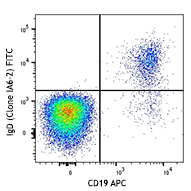
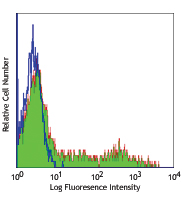
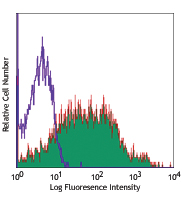
Compare Data Across All Formats
This data display is provided for general comparisons between formats.
Your actual data may vary due to variations in samples, target cells, instruments and their settings, staining conditions, and other factors.
If you need assistance with selecting the best format contact our expert technical support team.
-
FITC anti-human CD24
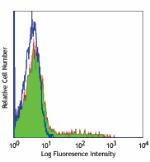
Human peripheral blood lymphocytes stained ML5 FITC -
PE anti-human CD24
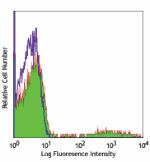
Human peripheral blood lymphocytes stained ML5 PE -
Purified anti-human CD24
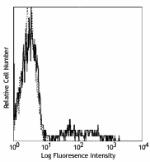
Human whole blood lymphocytes stained with purified ML5 and ... 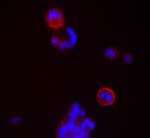
MCF-7 breast cancer cells were stained with anti-CD24 (clone... -
Alexa Fluor® 488 anti-human CD24
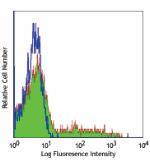
Human peripheral blood lymphocytes stained ML5 Alexa Fluor&r... -
Alexa Fluor® 647 anti-human CD24
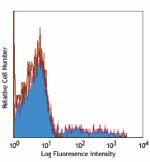
Human peripheral blood lymphocytes stained ML5 Alexa Fluor® ... 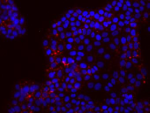
MDA-MB231 breast cancer cell line was stained with 10 µg/mL ... -
PerCP/Cyanine5.5 anti-human CD24
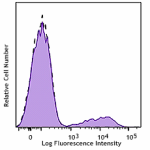
Human peripheral lymphocytes were stained with CD24 (clone M... -
APC anti-human CD24
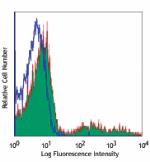
Human peripheral blood lymphocytes stained with ML-5 APC -
PE/Cyanine7 anti-human CD24
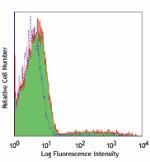
Human peripheral blood lymphocytes stained with ML-5 PE/Cyan... -
Brilliant Violet 421™ anti-human CD24
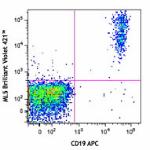
Human peripheral blood lymphocytes stained with CD19 APC and... 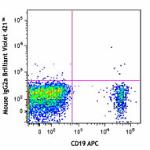
-
Brilliant Violet 605™ anti-human CD24
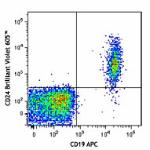
Human peripheral blood lymphocytes were stained with CD19 AP... 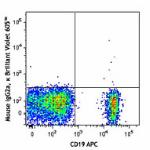
-
PerCP anti-human CD24
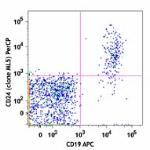
Human peripheral blood lymphocytes were stained with CD19 AP... 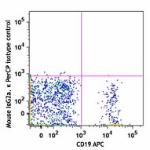
-
Brilliant Violet 510™ anti-human CD24
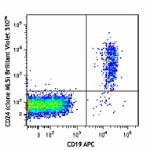
Human peripheral blood lymphocytes stained with CD19 APC and... 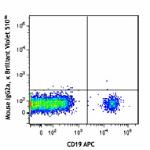
-
Purified anti-human CD24 (Maxpar® Ready)
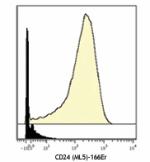
Human NALM-6 pre-B cells (top) and human Jurkat T cells (bot... -
Biotin anti-human CD24
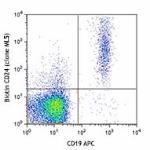
Human peripheral blood lymphocytes were stained with CD19 AP... 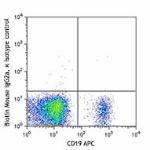
-
APC/Cyanine7 anti-human CD24

Human peripheral blood lymphocytes were stained with CD19 A... -
PE/Dazzle™ 594 anti-human CD24
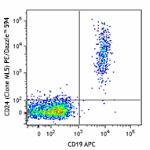
Human peripheral blood lymphocytes were stained with CD19 AP... 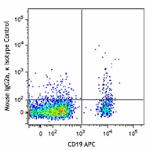
-
Brilliant Violet 711™ anti-human CD24
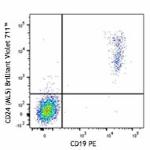
Human peripheral blood lymphocytes were stained with CD19 PE... 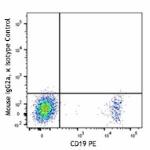
-
PE anti-human CD24

Typical results from human peripheral blood lymphocytes stai... -
TotalSeq™-A0180 anti-human CD24
-
APC/Fire™ 750 anti-human CD24

Human peripheral blood lymphocytes were stained with CD19 Br... -
Brilliant Violet 785™ anti-human CD24

Human peripheral blood lymphocytes stained with CD19 FITC an... -
TotalSeq™-C0180 anti-human CD24
-
TotalSeq™-B0180 anti-human CD24
-
PE/Cyanine5 anti-human CD24

Human peripheral blood lymphocytes were stained with anti-hu... -
TotalSeq™-D0180 anti-human CD24
-
GMP PE anti-human CD24
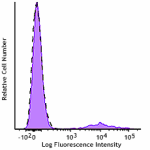
Typical results from human peripheral blood lymphocytes stai... -
APC/Fire™ 750 anti-human CD24
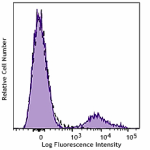
Typical results from human peripheral blood lymphocytes stai... -
Brilliant Violet 650™ anti-human CD24

Human peripheral blood lymphocytes were stained with anti-hu... -
PerCP/Cyanine5.5 anti-human CD24

Typical results from human peripheral blood lymphocytes stai... -
Spark Blue™ 550 anti-human CD24 (Flexi-Fluor™)
-
Spark Red™ 718 anti-human CD24 (Flexi-Fluor™)

 Login / Register
Login / Register 










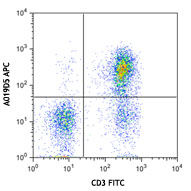



Follow Us